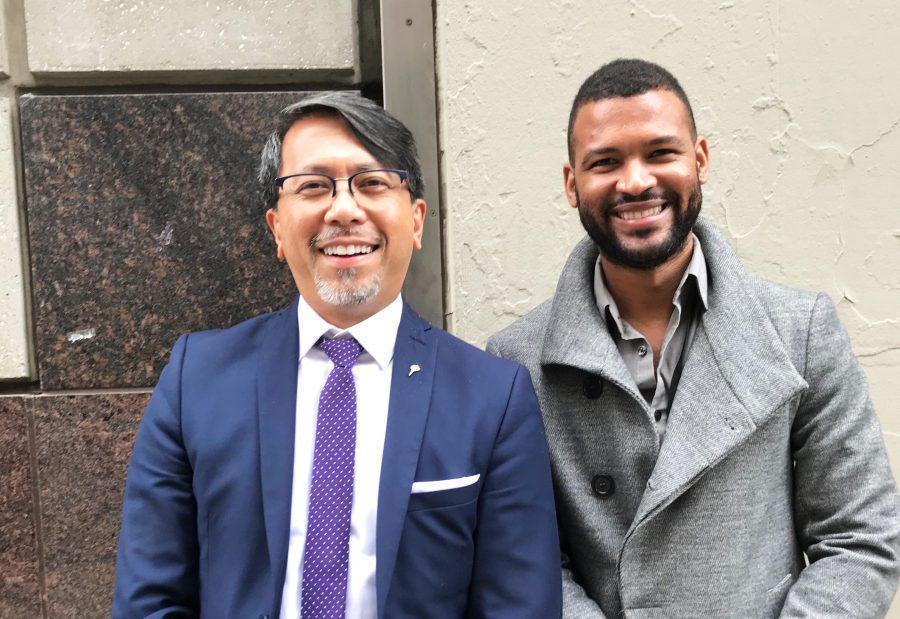Many students at NYU find it difficult to balance their lives between exams, internships and extracurriculars. But Frank Baez, a 2019 graduate of Rory Meyers College of Nursing, did something that most students couldn’t imagine: working through his degree as a custodian for the school.
Two years after coming to the U.S. from the Dominican Republic as a 17-year-old, Baez began working as a custodian at NYU Langone Hospital in order to get a steadier job than his supermarket cashier gig, helping provide for his mother and siblings while in high school.
“It was really rough; it was tough; it wasn’t easy, of course,” Baez told WSN. “But it was good because I was able to support my siblings and mom, the four of us. All of us were working in the house to stay afloat. Working and studying at the same time was difficult but manageable — but you have to pay rent, you have to survive.”
Baez’s brother worked as a patient transporter at Langone and helped him get the job by submitting a resume to SEIU Union 1199, a union for healthcare workers. After seeing an opening for a patient transporter role, Baez applied for the position because he wanted to do something that was more patient-centric.
Before entering an accelerated program at Meyers, Baez attended Borough of Manhattan Community College for his associate’s degree and then Hunter College to get a bachelor’s degree in Spanish literature with a minor in biological sciences. As an employee at NYU and a member of SEIU 1199, Baez was able to attend NYU at a 60% discounted rate and took out loans to cover the rest of his cost.
“I used to go to school from 8 a.m. to 2:10 p.m. on a normal day,” Baez said. “And once I finished school, I would go to work from there, where I would start from 3 p.m. and finish at 11 p.m. Go home at 11 p.m. and try to study and get everything done for the next day and stay up to date.”
Baez said there were many resources to help students in situations like his to perform to their full potential, but the most beneficial were mentorship programs like NYU Men in Nursing, which helped provide resources such as one-on-one tutoring and conferences on clinical subjects.
One of Baez’s former professors and mentor through the Men In Nursing program, Fidelindo Lim, described Baez as someone reserved, but well-connected.
“He’s a quiet person typically in class, but he always asks really good questions when he doesn’t understand a topic,” Lim said. “As a person, he’s very proactive and helpful, very generous with his time, helping his peers and getting them connected to all kinds of academic and social experiences and resources.”
Still, Baez sees opportunities to expand resources to help nontraditional students like himself.
“Having four full scholarships [in Meyers] is good, but we can have more,” Baez said. “When you think about private school, people get scared, thinking its expensive, but it’s an investment in your future. If we could provide more scholarships to people that would be amazing.”
Baez now works as a nurse in the Cardiothoracic ICU, carrying his lessons and past into the patient work he does today.
“At work, I see the housekeeper. I see the patient transporter. I see the clerk. I’ve been in each and every one of those roles. I’ve been there before. I have been there throughout my life and it makes me who I am today — to be able to be compassionate to everyone and caring, and it makes me feel like there is always an opportunity for growth.”
Today, when he isn’t working or reading novels by Jorge Luis Borges, Baez works with Lim in mentoring programs like Men In Nursing, or reaching out to all-boys high school groups like La Salle Academy. He said he’s trying to break the stigma of nursing being a position for only females through the Men Entering Nursing Program.
“There are many students who are in similar situations to Frank but don’t know how to find resources, and he’s very generous with his time to helping others get access to them,” Lim said.
Baez shared what he considers one of the most important lessons he’s learned through his academic and professional journey.
“Being humble is very important, not forgetting where you come from, your humble beginnings,” Baez said. “Even if you grow professionally or academically, don’t forget where you started. And people appreciate that when they get to know you and it translates into your care.”
A version of this article appeared in the Monday, October 28, 2019, print edition. Email Matthew Fischetti at [email protected].






















































































































































